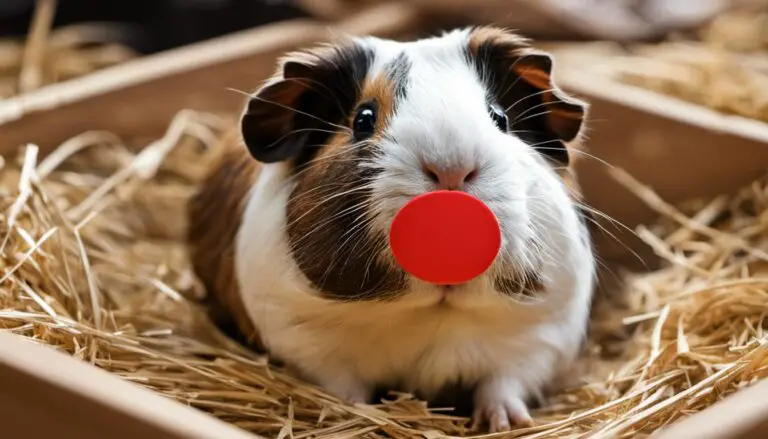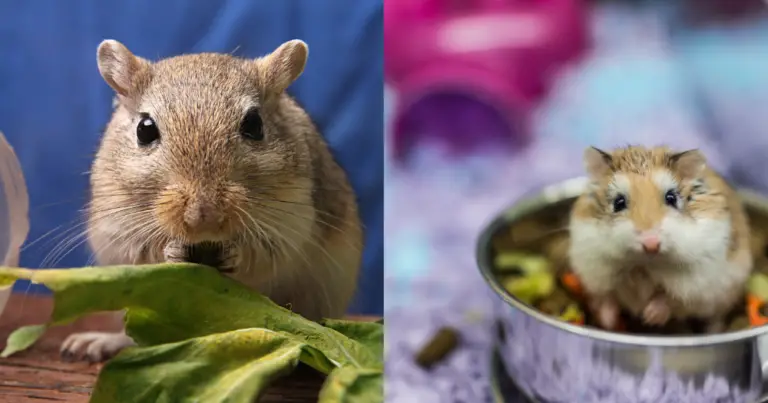Can Guinea Pigs Overheat? A Quick Guide on Temperatures and Safety

Guinea pigs can make delightful pets, but as their caretakers, it’s essential to be aware of their unique needs and how to maintain their health and comfort. As a guinea pig owner, you might wonder, “Can Guinea Pigs Overheat?” We have the answer!
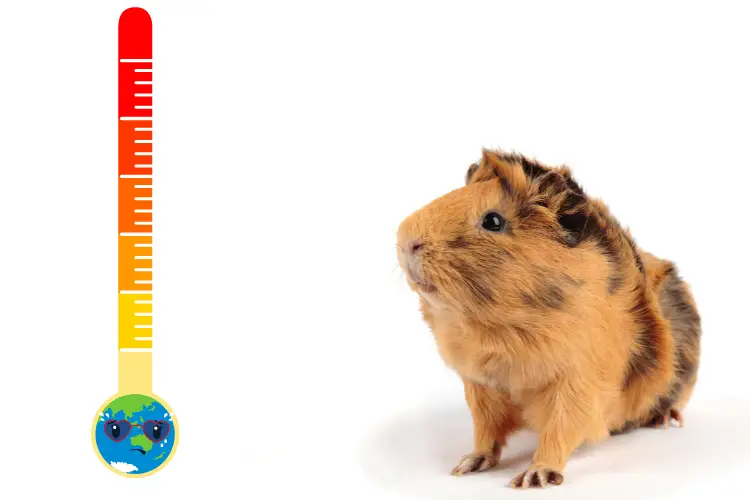
One important aspect of guinea pig care is ensuring that they don’t become overheated. Like humans, these small creatures are susceptible to heat-related issues, which can lead to serious health complications if not properly addressed.
Overheating in guinea pigs can occur for various reasons, such as high environmental temperatures, inadequate cooling options, and improper cage placement. Understanding the signs of an overheated guinea pig, including lethargy, panting, and laying flat on their belly, is crucial to taking prompt action for their well-being.
Contents
Table of Contents
Preventing overheating involves simple steps like providing shade, keeping their environment cool, and proper grooming to maintain a healthy coat that doesn’t trap excess heat.
Understanding Guinea Pig Overheating
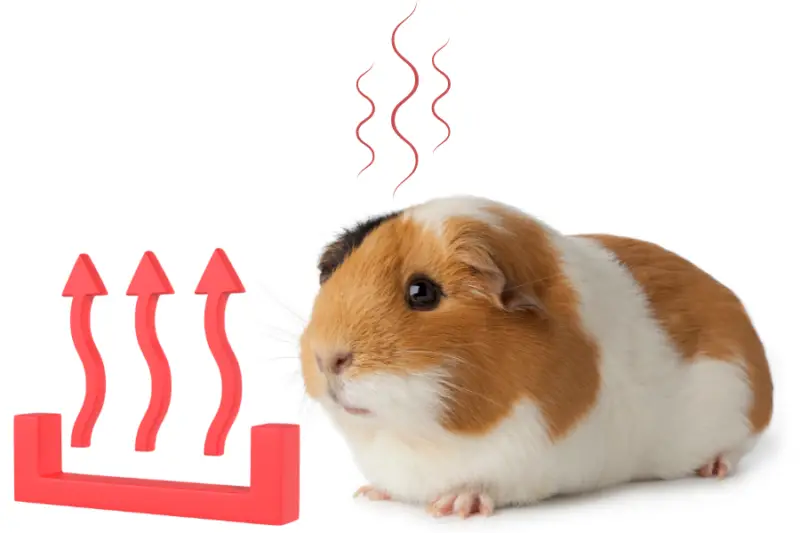
Guinea pigs are sensitive creatures, and their health can be affected by temperature fluctuations, especially during hot weather. Overheating can lead to various health issues and even death in severe cases. In this section, we will discuss the signs of overheating, heatstroke in guinea pigs, and the causes of overheating.
Signs of Overheating
Knowing the signs of overheating in guinea pigs can help you take prompt action to avoid further complications. Some common symptoms of overheating include:
- Panting or rapid breathing
- Red tongue
- Lethargy or decreased activity
- Drooling or slobbering
If you notice any of these signs, it’s crucial to cool down your guinea pig immediately to prevent heatstroke and other health issues.
Heatstroke in Guinea Pigs
Heatstroke is a severe condition that can result from overheating. It can happen in less than an hour and is a life-threatening situation for your guinea pig. Heatstroke can be caused by various factors, such as being left in a hot vehicle, sitting in direct sunlight, or being outside on a hot day. If you suspect your guinea pig is experiencing heatstroke, it’s crucial to act quickly by cooling their body down with cool water, but be careful not to shock their system by using cold water.
Causes of Overheating
Several factors can contribute to guinea pigs overheating:
- High ambient temperature: Hot weather conditions can increase the risk of overheating, especially if your guinea pig is exposed to high temperatures for extended periods.
- Inadequate shade: When placed outdoors, guinea pigs need access to shade to prevent overheating. Direct sunlight can quickly raise their body temperature.
- Lack of hydration: Dehydration can exacerbate overheating symptoms, so it’s essential to provide your guinea pig with access to fresh, cool water.
- Poor ventilation: Hot and stuffy environments can make it difficult for your guinea pig to regulate its body temperature. Ensure that their living space has proper airflow.
Keep these factors in mind to protect your guinea pig from overheating and to maintain their overall health and well-being.
Preventing Overheating in Guinea Pigs
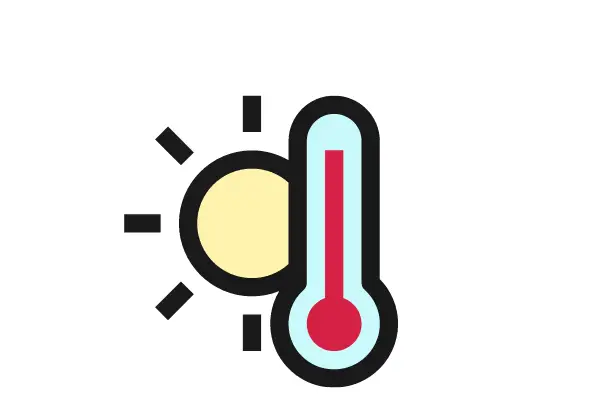
Ideal Living Conditions
To keep your guinea pig comfortable and safe from overheating, it’s essential to maintain an ideal temperature in their living environment. Aim for a room temperature between 65°F and 75°F (18°C to 24°C) with good air circulation. You can use air conditioning or fans to help, but avoid blowing air directly onto your guinea pig. Place their cage in a location away from direct sunlight, vents, and drafts.
Proper Hydration
Proper hydration is crucial for all pets, especially during warmer months. Provide your guinea pig with a water bottle filled with fresh, cool water daily. Make sure the water bottle is accessible and easy to use. Check the water level frequently, refilling it as needed to ensure they always have enough water to drink. In addition, it’s good practice to offer water-rich foods like cucumber slices to help keep them hydrated.
Summer Care Tips
Here are some helpful tips to keep your guinea pig cool and safe during hot weather:
- Shaded area: If you place your guinea pig’s cage outside, move it to a shaded area to keep them cool and protected from direct sunlight. Monitor the area throughout the day and adjust the shade as needed.
- Grooming: Regular grooming helps keep your guinea pig’s coat clean and cool. If your guinea pig has long fur, trim its coat to a shorter length to help prevent overheating.
- Cooling pad: Purchase a cooling pad designed for small pets and place it in their cage to create a cool surface for them to lie on. Ensure the cooling pad is non-toxic and safe for guinea pigs.
- Air-conditioned room: Take your guinea pig into an air-conditioned room on hot days as a break from the heat.
- Young and vulnerable guinea pigs: Pay particular attention to young guinea pigs and those with health conditions. They are more susceptible to overhearing and may need extra care during hot weather.
By following these tips and giving proper care to your guinea pig’s living conditions, hydration, and handling during hot weather, you can significantly reduce the risk of overheating and help keep your pet cool and comfortable.
Treatment for Overheating Guinea Pigs
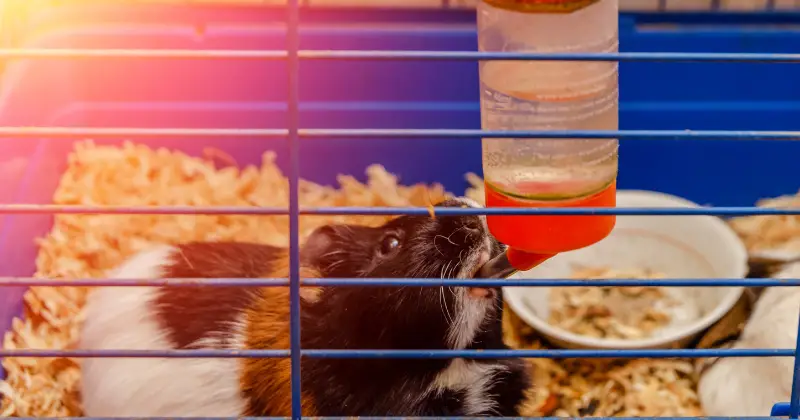
First Aid Steps and Immediate Actions
If you notice your guinea pig is overheating, acting quickly is important. Start by wetting your hand and running it through their fur to cool them down slowly. Be careful not to soak them in cold water, as it could shock their system. Instead, gradually cool them using a wet towel.
Creating a cooler environment is also essential. Move your guinea pig to a cooler area in the shade, away from direct sunlight, and consider using a portable air conditioner or fans. Ensure the fans are not blowing directly onto the guinea pig, which may cause further stress. Prolonged exposure to heat can lead to organ damage and other serious health issues.
When to Contact a Veterinarian
If your guinea pig is convulsing, having seizures, or falls into a coma due to overheating, seek veterinary attention immediately. The veterinarian may administer intravenous fluids and monitor their body temperature to prevent further complications.
It’s also important to contact a veterinarian if your guinea pig shows signs of an upper respiratory infection or diarrhea after an overheating episode. These are possible complications that require professional treatment.
Recovery and Aftercare
Once your guinea pig has been cooled down, watch them closely for any signs of distress. Provide fresh water to keep them hydrated, and consider offering ice cubes as a cooling treat.
During recovery, keep your guinea pig in a secure and comfortable environment, away from predators and stressors. Monitor your guinea pig’s body temperature regularly to avoid hypothermia, which may occur if they are cooled down too quickly.
In most cases, the prognosis for overheating is good as long as the guinea pig receives prompt first aid and is cooled down safely and controlled. Taking these precautions will help ensure a full recovery for your guinea pig after an overheating event.
How to Keep Guinea Pigs Cool in Hot Weather & Heatwaves | Guinea Pig Care & Tips
Additional Tips for Guinea Pig Care in Hot Weather
Guinea pigs are sensitive animals that can easily overheat, especially during the hot summer months. This section will discuss some additional tips to help keep your guinea pig cool and comfortable during hot weather.
Outdoors and Playtime Safety
When taking your guinea pig outside for fresh air or playtime, it’s essential to be mindful of the weather conditions. Avoid exposing them to direct sunlight, as guinea pigs can suffer from heatstroke in less than an hour. Instead, provide a shaded area, such as a burrow or a covered hiding spot, in which they can seek refuge from the sun. Keep them away from heat vents and heat lights, as these can increase the risk of overheating.
Additional Cooling Methods
There are several ways to keep your guinea pig comfortable during hot weather:
- Use a cooling pad or mat to help lower their body temperature by providing a cool surface to lie on. Make sure your guinea pig has access to these cool areas at all times.
- Provide water-heavy foods like cucumber and berries. You can also soak their leafy greens in ice water before serving.
- Wrap your guinea pig in a cool towel, but remember to avoid covering their head. This can help to bring down their body temperature.
- Fans can be used to circulate cool air, but ensure they are not blowing directly onto your guinea pig.
Monitoring Your Guinea Pig’s Health
Keep a close eye on your guinea pig’s health during hot weather. Regularly check their body temperature using a thermometer, and observe for signs of overheating, such as panting, drooling, or listlessness. Guinea pigs do not have sweat glands, so it’s important to keep an eye on their oxygen intake. If you notice any heatstroke signs, take your guinea pig to a veterinarian immediately.
Remember never to leave your guinea pig in a hot vehicle, as this can lead to a life-threatening situation. Following these tips and taking extra precautions can help keep your guinea pig happy, healthy, and safe during hot weather.
FAQs: Can Guinea Pigs Overheat
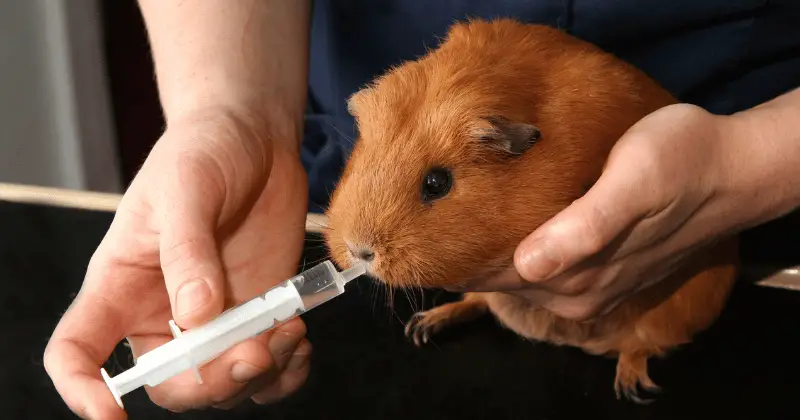
Q: How can I help prevent heat stress in my guinea pig?
A: To prevent heat stress, ensure your guinea pig has a cool and shady spot to retreat to. You can place a wet towel or provide a cool, damp area for them to rest on. Avoid exposing them to extreme heat or direct sunlight.
Q: How can I keep my guinea pig cool in warm weather or during the summer months?
A: Provide your guinea pig with plenty of fresh water in a water bowl, ensuring it is clean and easily accessible. You can also place frozen water bottles wrapped in a clean towel in their enclosure to help lower the temperature. Avoid using extremely cold or icy water.
Q: Are certain guinea pig breeds or overweight guinea pigs more susceptible to overheating?
A: While all guinea pigs are at risk of overheating, certain breeds and overweight guinea pigs may be more prone to heat-related issues. Extra caution should be taken with these individuals to ensure they stay cool and hydrated.
Note: It’s crucial to monitor your guinea pig closely during periods of high temperatures. If you suspect heatstroke or heat exhaustion, seek immediate medical attention from an animal clinic or a companion animal practice experienced in treating guinea pigs. Wooden houses or shelters made of natural materials can provide additional shade and help regulate temperature.
Remember, providing a cool and comfortable environment, along with proper hydration and access to leafy greens, is essential for keeping your guinea pig hydrated and healthy in warm weather.

